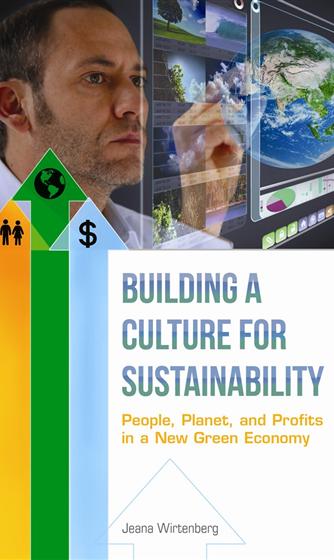 Changing company culture is the biggest challenge for sustainability champions. Jeana Wirtenberg gleans best practices and lessons learned from case studies of nine leading companies’ experiences to provide a buffet of proven approaches for hungry culture change agents. Perfect Now let’s get on with it. Bob Willard, Author and Speaker, Sustainability Advantage
Changing company culture is the biggest challenge for sustainability champions. Jeana Wirtenberg gleans best practices and lessons learned from case studies of nine leading companies’ experiences to provide a buffet of proven approaches for hungry culture change agents. Perfect Now let’s get on with it. Bob Willard, Author and Speaker, Sustainability Advantage
There is more will than ever to make sustainability happen, and happen in deep, meaningful, world-changing and profit-enhancing ways. A company’s operations are truly sustainable only when sustainability is part of everyone’s job and built into everything from daily decision making to yearly performance objectives. Just as quality of work and product is an unquestioned element of everyone’s job, so must sustainability be fully integrated into everyday business practices.
Fortunately, a large number of companies are doing just that, probably more than most people realize. Many others want to but haven’t quite figured out how yet. Of course, there are some who still haven’t realized business has got to change—but they will. Many companies (and other organizations, such as universities, nonprofits, and governments) get stalled in making the transition from recognizing the importance of sustainability to walking the talk simply because they’re not sure how.
Jeana Wirtenberg knows sustainability is about people. Living, caring human beings – who get things done. It’s not “green.” Or “eco.” Not goals or dashboards. Not on their own, at any rate. It’s people who make these things actually happen.
My mission is to show them how and guide them along the way. My intention is to create a road map for business leaders to create purposeful work environments that ignite employee passion, encourage engagement, reinforce ecological responsibility and increase profit. In my new book, I introduce nine great companies and dozens of committed people who are already on this path, and are eager to share their stories. And I’ve done years of research that further provides clear and actionable insights about what needs to happen. Until now, we haven’t really had a body of knowledge and models for companies to follow, and everyone had to try to invent their own. But that’s no longer the case.
It may be that knowledge is arriving at just the moment when a critical mass of companies are ready to shift sustainability into high gear. The concept of sustainability has been around long enough to go from being an environmentalist term to a standard part of the corporate lexicon. Today we see a shift in focus to an “integrated bottom line” ?that not only enhances the financial platform of any company, but also the wellbeing of its employees and responsibility to the planet. Moreover, many CEOs are seeking to rapidly accelerate these changes in business practices with a sense of urgency in response to climate change and global warming.
We are at a tipping point and on the cusp of a new era. Sustainability will soon not be a concept shunted off in a special department somewhere, but as much a part of the lifeblood of any business as revenue, profits, and quality.



